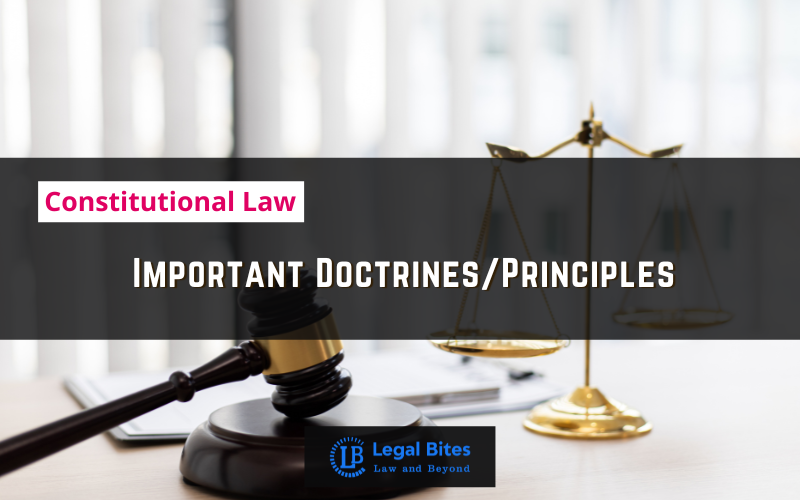Trade, Commerce and intercourse shall be free throughout the territory of India. Discuss with reference to decided cases.
Question: Trade, Commerce, and intercourse shall be free throughout the territory of India. Discuss with reference to decided cases. [BJS 1975] Find the answer to the mains question only on Legal Bites. [Trade, Commerce, and intercourse shall be free throughout the territory of India. Discuss with reference to decided cases.] Answer Part XIII of the constitution contains provisions… Read More »
;
Question: Trade, Commerce, and intercourse shall be free throughout the territory of India. Discuss with reference to decided cases. [BJS 1975] Find the answer to the mains question only on Legal Bites. [Trade, Commerce, and intercourse shall be free throughout the territory of India. Discuss with reference to decided cases.] Answer Part XIII of the constitution contains provisions relating to the freedom of trade, commerce, and intercourse within the territory of India. The provisions...
Question: Trade, Commerce, and intercourse shall be free throughout the territory of India. Discuss with reference to decided cases. [BJS 1975]
Find the answer to the mains question only on Legal Bites. [Trade, Commerce, and intercourse shall be free throughout the territory of India. Discuss with reference to decided cases.]
Answer
Part XIII of the constitution contains provisions relating to the freedom of trade, commerce, and intercourse within the territory of India. The provisions are laid down in Articles 301-307.
Article 301 reads: “subject to the other provisions of this part, trade, commerce and intercourse throughout the territory of India shall be free.” Thus, ‘freedom of trade, commerce and intercourse’ means the free movement/transport and exchange of goods. It means that there shall be no prior restraint upon trade and commerce. The provision secures the freedom subjected to restrictions/limitations which may be imposed under other provisions of part 13. While the general rule of freedom of trade and intercourse is enunciated n article 301, it may be subjected to restrictions laid down in Articles 302-305.
- it is subject to the non-discriminatory restrictions imposed by parliament, in the public interest [Article. 302].
- even discriminatory or preferential provisions may be made by parliament, for the purpose of dealing with a scarcity of goods arising in any part of India [Article 303(2)].
- non-discriminatory taxes may be imposed by states on goods imported from other states similarly as on goods produced within the state [Article. 304(a)].
- reasonable restriction may be imposed by a state “in the public interest” [Article 304(b)].
- restrictions imposed by “existing law” (an act passed before the commencement of the constitution) and laws providing for state monopolies to continue except in so far as provided otherwise by an order of the president [Article 305].
- Article 307 empowers parliament to appoint by law such authority, as it considers appropriate for carrying out the purposes of Articles 301-304.
- restrictions on freedom of trade under parliamentary law [Articles 302-303]
In State of Bombay v. RMDC, 1957 AIR 699 it has been held that the protection offered by Article 301 is confined to such activities as may be regarded a lawful trading activity and does not extend to activities which are res extra commercial i.e. activities which could not be said to be trade or commerce or business. In this case, the Bombay lotteries and Prize Competitions Control and Tax (Amendment) Act, 1952, imposing restrictions on prize competition was upheld as not violative of Article 301 for, being of gambling nature, holding of lotteries and prize competitions, could not be regarded as trade or commerce.
In the case of Prag Ice & Oil Mills v. Union of India, AIR 1978 SC 1296, it was held by the Supreme Court that even though Article 302 does not speak about reasonable restrictions, but still the restrictions which can be imposed under this Article should have a reasonable nexus with the public interest for which the restriction is placed.
Important Mains Questions Series for Judiciary, APO & University Exams
- Constitutional Law Mains Questions Series Part-I
- Constitutional Law Mains Questions Series Part-I
- Constitutional Law Mains Questions Series Part-II
- Constitutional Law Mains Questions Series Part-IV
- Constitutional Law Mains Questions Series Part-V
- Constitutional Law Mains Questions Series Part-VI
- Constitutional Law Mains Questions Series Part-VII
- Constitutional Law Mains Questions Series Part-VIII
- Constitutional Law Mains Questions Series Part-IX
- Constitutional Law Mains Questions Series Part-X



